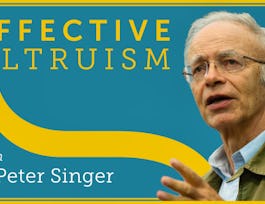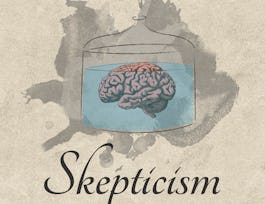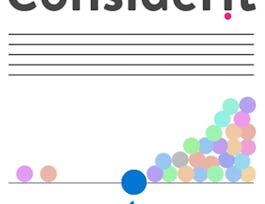- Explore
- Arts and Humanities
- Philosophy
Philosophy
Earn Your Degree
Most Popular Courses
Popular Topics
Beginner Philosophy Courses
Top Rated Courses
Most Popular Certificates
More Philosophy Courses
Recently Launched Guided Projects
Frequently Asked Questions about Philosophy
Philosophy means "love of wisdom" in Greek, and this discipline indeed dates back to the classical philosophers of ancient Greece like Plato and Aristotle. These great thinkers created frameworks of reasoning and logic that we still use today to understand the most important questions of existence: What is human nature? How do we live a moral life? What is the meaning of happiness? and more.
Of course, philosophy didn't stop evolving in the 4th century B.C. Thinkers throughout the ages have built upon this tradition - and, at times, radically questioned it. From Enlightenment giants like Immanuel Kant, to German idealists such as Georg Wilhelm Friedrich Hegel, to influential postmodernists like Jacques Derrida, philosophers have continued to push the field in new directions that have inspired political and artistic movements around the world.
Even if your goal isn't to become a world-renowned philosopher yourself, the skills you can develop through the study of philosophy can be invaluable. Knowing how some of the greatest thinkers in history understood the world can provide a powerful lens for analysis that can be applied to questions in your personal life, in your understanding of the world, and in a wide range of careers.
Even if you don't know any professional philosophers, you might be surprised to learn how relevant an education in philosophy is. Despite the seemingly abstract nature of this field, the skills of logic, close reading, and concise writing that are at the core of philosophy have very concrete applications in virtually any field that requires critical thinking and communications skills.
Many lawyers major in philosophy before going to law school. The skills of argumentation and debate that characterized the very earliest philosophers are still extremely relevant in the courtroom, as evidenced by the enduring relevance of the Socratic method in many law schools.
The expertise of philosophers in understanding the root of human desires and how they are communicated also lends itself to commercial applications. For example, marketing researchers might draw on courses in philosophy to better understand the underlying drivers of consumer demand. Similarly, strategists at digital or advertising agencies might draw on the wisdom of the ages to come up with messaging that resonates. Of course, if you are deeply passionate about your perspectives on the discourse of philosophy itself, you may wish to go into academia and become a professor in this field. For all the reasons above, philosophy remains a popular subject with students - and a satisfying topic to teach.
Absolutely! Coursera's online learning platform gives you the experience of learning at a top-ranked university from anywhere in the world, on a flexible schedule, and, often, at a lower cost. Importantly for philosophy students, learners on Coursera also get access to video lectures and live office hours with faculty, giving them the opportunity to learn through the same types of engaging discussions that have always been at the heart of this field.
Coursera gives you access to courses in popular topics in philosophy ranging from ancient Greek and Roman philosophy and mythology to the role of social norms and ethics in creating change in society to the shifting definitions of facts and subjectivity in the postmodern era. And the ability to learn from prestigious institutions like the University of Pennsylvania, Wesleyan University, and the University of Edinburgh ensures that learners on Coursera can take advantage of the benefits of online education without sacrificing the quality of their education.
Philosophy courses on Coursera equip learners with a range of analytical and critical thinking skills, exploring profound questions about human existence, ethics, knowledge, and the nature of reality, including:
- Understanding key philosophical concepts, theories, and arguments from both historical and contemporary perspectives.
- Developing critical thinking skills to analyze and evaluate arguments effectively.
- Engaging with complex texts and ideas, enhancing reading comprehension and intellectual curiosity.
- Skills for articulating and defending positions clearly and logically in both written and oral forms.
- Exploring applied philosophy in areas such as ethics, political philosophy, and metaphysics.
- Reflecting on personal and societal beliefs, encouraging a deeper understanding of one’s values and ethical commitments.
Philosophy courses on Coursera are accessible to learners with all levels of experience:
- Beginners: No prior knowledge is necessary. Introductory courses provide foundational understanding of major philosophical questions and methods.
- Intermediate Learners: Those with some exposure to philosophy can expand their understanding through courses that explore specific branches or themes in more depth.
- Advanced Professionals: Experienced philosophers or students can engage with specialized topics, including advanced theory and its applications in contemporary issues.
By participating in Philosophy courses on Coursera, you can achieve various credentials that substantiate your philosophical knowledge and skills:
- Course Certificates: Earn a certificate for each philosophy course you complete, demonstrating your engagement with and understanding of the material.
- Professional Certificates: These certificates can prepare you for roles that require strong analytical and ethical reasoning skills.
- Specializations: Explore comprehensive study tracks that culminate in capstone projects, allowing you to apply philosophical theories to real-world scenarios.
Skills acquired from studying philosophy are highly valued across various fields, offering career opportunities in:
- Education: Teaching philosophy at secondary or higher education levels.
- Public Policy: Applying ethical reasoning and critical analysis to develop and assess policy.
- Law: Utilizing skills in argumentation and ethical reasoning in legal professions.
- Journalism and Writing: Analyzing and writing about complex topics requiring deep understanding and critical analysis.
- Nonprofit and Community Leadership: Guiding organizations with a focus on ethical practices and philosophical foundations.
Online Philosophy courses offer a convenient and flexible way to enhance your knowledge or learn new Philosophy skills. Choose from a wide range of Philosophy courses offered by top universities and industry leaders tailored to various skill levels.
When looking to enhance your workforce's skills in Philosophy, it's crucial to select a course that aligns with their current abilities and learning objectives. Our Skills Dashboard is an invaluable tool for identifying skill gaps and choosing the most appropriate course for effective upskilling. For a comprehensive understanding of how our courses can benefit your employees, explore the enterprise solutions we offer. Discover more about our tailored programs at Coursera for Business here.









































































